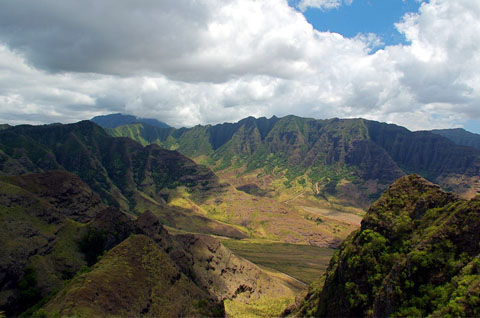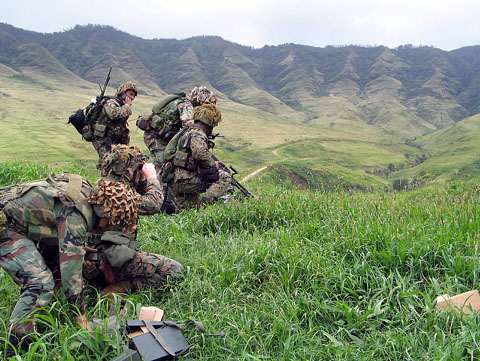by Nani Rogers on 13 March 2008
Aloha kakou,
Our hats are off to all our ohana on Oahu for all the years of persevering to stop the desecration of Makua Valley.
We aloha all of you and stand in solidarity with your ku`e! Now if only we could stop the military at PMRF from launching more missiles that are aimed at the Marshall Islands and whose trajectory will be over/near our na kupuna islands, Papahanaumokuakea.
Earthjustice claims win in Makua military lawsuit Associated Press 12 March 2008 in The Honolulu Star Bulletin
A federal judge told the Army yesterday to quickly expand cultural access to
native Hawaiian sites at its Makua Military Reservation A , according to Earthjustice, which represents the community group Malama Makua.
The environmental law firm said U.S. District Judge Susan Oki Mollway gave
the Army until April 15th to identify high-priority sites for clearing unexploded ordnance in order to increase access to cultural sites.
Mollway also ruled the Army must provide a good-faith plan to clear the
ordnance from the sites by July 15th, it said.
A message seeking comment from a U.S. Army Pacific spokesman wasn't
immediately returned.
Earthjustice said the Army had been required to expand access under a 2001
settlement with Malama Makua.
"We're glad the court will be holding the Army's feet to the fire to make sure it finally keeps its promises and expands opportunities for cultural access to Makua's sacred sites," said Malama Makua's president, Sparky Rodrigues.
"Without access to sites, we cannot connect with our ancestors, aumakua
(family gods) and akua (gods)," he said. "The Army's failure to keep its word
these past seven years has been like locking the door to our church."
Earthjustice attorney David Henkin said the order reaffirms the Army is not
above the law.
"Nearly seven years ago, the Army pledged it would move quickly to expand
cultural access at Makua," he said. "Instead of honoring that pledge, the Army
used every excuse it could concoct to keep native Hawaiian practitioners from
the valley's sacred sites.
"We are hopeful that, with the firm guidance the court provided today, we will finally be able to work with the Army to fulfill the 2001 settlement's promise of restoring cultural life to Makua," Henkin said.
Malama Makua sued the Army in 1998 to force it to complete an environmental
impact statement before continuing to use the valley for live-fire training.
A judge ruled in favor of the group, though soldiers and Marines were allowed to resume live-fire training after the September 11th, 2001, terrorist attacks to prepare for A judge r deployments.
But the Army had to stop using the area again more than three years ago
because it hadn't conducted the environmental study. It has been sending soldiers out of state for live-fire training while it finishes the report. |

image above: Makua Valley rim from University of Hawaii IFA
Army sued again over access to Makua
Staff 21 February 2008 in The Honolulu Advertiser
Earthjustice has made good on its pledge to take the U.S. Army back to court over what it sees as flagrant violations of a 2001 court-ordered settlement decree to allow Native Hawaiian groups cultural access to numerous sacred sites in the Makua Military Reservation.
The ecology-minded law firm, which represents Malama Makua among other cultural groups, filed a motion to enforce compliance yesterday in U.S. District Court. Earthjustice is asking the court to require the Army to fulfill the terms of the six-year-old settlement it voluntarily signed.
That agreement followed a lawsuit challenging the Army's failure to complete a required environmental impact statement for training at Makua Valley.
David Henkin, an attorney for Earthjustice, said yesterday that instead of opening up access to the valley, the Army has, since 2005, severely restricted cultural practices, citing safety concerns as the reason. Earthjustice contends the safety restrictions have been concocted to get around the settlement decree in order to eliminate nearly all cultural access.
The Army last night issued a written response saying "the Army has gone to great lengths to provide community access" and that any limitations on access have been prompted by safety concerns over unexploded ordnance that visitors could encounter.
The Army said it provided access to two more sites at Makua Military Reservation on February 10th after making sure the areas were cleared of unexploded ordnance.
"The Army was already in consultation with Malama Makua and other consulting parties about providing additional access to recently cleared areas prior to the motion filed today," its statement said.
Howard Sugai, a spokesman for the Army's Installation Management Command at Fort Shafter, yesterday said the military is aware of the latest Earthjustice legal action and is taking it under advisement.
Last July, cultural groups were told they would no longer be allowed at four valley sites they had visited in the past. In November, Malama Makua and Hui Malama 'O Makua canceled a two-day traditional makahiki celebration because they said the military was deliberately too slow in removing a 250-pound World War II bomb uncovered at the reservation.
"By denying access, the Army is denying our right to practice our religion," said Malama Makua president Sparky Rodrigues.
Between 2001 and 2004, numerous cultural practitioners were allowed onto more than a dozen cultural sites without a problem, Henkin said. Then, in February 2005, the Army abruptly halted access to all but one location near the entrance of the reservation. Other sites were either off-limits completely or severely restricted, he said.
"That's where we've been for three years," said Henkin, who added that Earthjustice's efforts to negotiate an end to the impasse have come to nothing. "Not only are they required to let us into those sites, but under the agreement they were supposed to promptly take action to open up new areas that hadn't been accessed before. None of that has been done."
The Army noted that there is a shortage of military explosive disposal experts due to overseas deployments, and that the Army has had to contract civilian explosive ordnance disposal contractors.
The Army said it has spent more than $364,000 and 4,000 man-hours to clear roads and access areas of unexploded bombs, but did not specify what time period that covers. |
|

